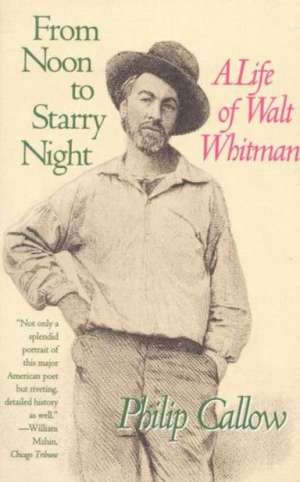From Noon to Starry Night: A Life of Walt Whitman
Autor Philip Callowen Limba Engleză Paperback – 31 iul 1996
Preț: 88.27 lei
Nou
Puncte Express: 132
Preț estimativ în valută:
16.89€ • 17.69$ • 13.100£
16.89€ • 17.69$ • 13.100£
Comandă specială
Livrare economică 21 martie-02 aprilie
Doresc să fiu notificat când acest titlu va fi disponibil:
Se trimite...
Preluare comenzi: 021 569.72.76
Specificații
ISBN-13: 9781566631334
ISBN-10: 1566631335
Pagini: 411
Dimensiuni: 140 x 222 x 28 mm
Greutate: 0.5 kg
Ediția:Elephant Paperb.
Editura: Ivan R. Dee Publisher
ISBN-10: 1566631335
Pagini: 411
Dimensiuni: 140 x 222 x 28 mm
Greutate: 0.5 kg
Ediția:Elephant Paperb.
Editura: Ivan R. Dee Publisher
Recenzii
His prose is clear and easy and elegant, his observations sharp but kind and never superficial.--V.S Naipaul
Notă biografică
Textul de pe ultima copertă
In From Noon to Starry Night, published on the 100th anniversary of Walt Whitman's death, the great Poet of democracy has at last found his biographer. Philip Callow brings to Whitman's extraordinary life the skills and sensitivities of novelist, poet, and biographer. Here is the life of America's poet - beguiling, surprising, in some ways magical - a wonderfully detailed portrait, lyrically told. More successfully than any earlier biography, Callow's has captured Whitman's elusive truth. The shadows of Whitman's life hide "the actual person, if we can only find him, smiling evasively in his thicket of identities", Callow writes. "He is curious, a great puzzle...He lives on so many levels: learns a trade, lives with mates as a skilled man, and then in the heavy weather of buccaneer journalism, the daily Politics of local issues. A psychological oddity, he loves the ebb and flood of crowds, yet is fundamentally a solitary, with a weird sexual fluidity that remains a riddle to this day, carefully hidden from others as it is from himself. "Fearing intimacy he becomes an enchanter, a stubborn innocent branded an obscene immoralist, shocking contemporaries with his candor. His health shattered by the 'butcher' wards of the Civil War hospitals, he experiences transactions of love there which are the most satisfying of his life. We seem to know everything and yet nothing about this baffling subject. Contradictory to the last, he affirms life and is inspired by death". Drawing upon a broad range of sources, and quoting liberally from Whitman's poems, Callow has re-created the poet's life in all its roundness and intricate corners. In a compelling blending of fact and interpretation, he gives usthe man behind America's "first genuine voice...The sheer certainty of this voice can still astonish us - the passage of time has done nothing to dull it". Democracy was Whitman's great subject. He was, Callow observes, a democrat who set out to imagine the life of the average man in average circumstances changed into something grand and heroic. "To draw close to Whitman is to come to grips with our own doubts and dreams and absurdities", Callow writes. "If we are to believe in a future, in democracy, in individual regeneration as the measure of the world's worth, we should look again at a poet who wanted his poems to circulate as a 'coarse but warm blood' and be a testament to our common humanity". When Whitman died he was largely unknown in his own country. It was Kafka who later wrote, "His life is his real masterpiece". He comes alive again in Philip Callow's perceptive and evocative biography.
